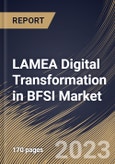Modern businesses employ strategies, tools, and processes called "digital transformation" in the BFSI industry to better their sales and operational processes. The main aim of digital transformation in the BFSI industry is to streamline vital organizational procedures and automate and digitize banking and fintech firms' processes. The BFSI industry's digital transformation has several advantages, including improved security features, a more effective risk management system, the automation of tedious processes, and others.
Additionally, BFSI businesses progressively adopt a customer-centric strategy, emphasizing providing individualized experiences and developing their goods and services to satisfy distinct client requirements. Understanding consumer preferences or underlying behaviors will be vital to data analytics, digital channels, and AI-driven insights. The proliferation of mobile devices has also altered how clients engage with BFSI services. The popularity of online platforms and mobile banking apps has prompted BFSI organizations to invest in digital channels to match consumer demand. All these elements contribute to expanding the market.
Recently, Saudi Arabia, the UAE, and Egypt have seen a rise in fintech firms in the Middle East. The relevance of fintech and digital banking is widely acknowledged by Middle Eastern governments, which is changing the regulatory environment to support these industries' expansion. Al Rajhi Bank in Saudi Arabia has embraced digital banking, focusing on mobile banking. They offer a feature-rich mobile app that allows customers to perform various transactions, pay bills, and even open new accounts digitally. These aspects collectively show that the market is flourishing in the LAMEA region.
The Brazil market dominated the LAMEA Digital Transformation in BFSI Market, By Country in 2022, and would continue to be a dominant market till 2029; thereby, achieving a market value of $4,061.3 million by 2030. The Argentina market is exhibiting a CAGR of 19.5% during (2023 - 2030). Additionally, The UAE market would experience a CAGR of 18.5% during (2023 - 2030).
Based on End User, the market is segmented into Banks, Insurance Companies, and Others. Based on Enterprise Size, the market is segmented into Large Enterprises, and Small & Medium Enterprises. Based on Deployment Type, the market is segmented into On premise, and Cloud. Based on Technology, the market is segmented into Big Data & Business Analytics, Artificial Intelligence, Cybersecurity, Cloud Computing, Blockchain, and Others. Based on countries, the market is segmented into Brazil, Argentina, UAE, Saudi Arabia, South Africa, Nigeria, and Rest of LAMEA.
The market research report covers the analysis of key stakeholders of the market. Key companies profiled in the report include HID Global Corporation (Assa Abloy AB), Google LLC (Alphabet Inc.), Microsoft Corporation, SAP SE, Oracle Corporation, Alphasense, Inc., Accenture PLC, Cognizant Technology Solutions Corporation, Fujitsu Limited, and IBM Corporation.
Scope of the Study
Market Segments Covered in the Report:
By Component- Solution
- Services
- Banks
- Insurance Companies
- Others
- Large Enterprises
- Small & Medium Enterprises
- On premise
- Cloud
- Big Data & Business Analytics
- Artificial Intelligence
- Cybersecurity
- Cloud Computing
- Blockchain
- Others
- Brazil
- Argentina
- UAE
- Saudi Arabia
- South Africa
- Nigeria
- Rest of LAMEA
Key Market Players
List of Companies Profiled in the Report:
- HID Global Corporation (Assa Abloy AB)
- Google LLC (Alphabet Inc.)
- Microsoft Corporation
- SAP SE
- Oracle Corporation
- Alphasense, Inc.
- Accenture PLC
- Cognizant Technology Solutions Corporation
- Fujitsu Limited
- IBM Corporation
Unique Offerings
- Exhaustive coverage
- The highest number of Market tables and figures
- Subscription-based model available
- Guaranteed best price
- Assured post sales research support with 10% customization free
Table of Contents
Companies Mentioned
- HID Global Corporation (Assa Abloy AB)
- Google LLC (Alphabet Inc.)
- Microsoft Corporation
- SAP SE
- Oracle Corporation
- Alphasense, Inc.
- Accenture PLC
- Cognizant Technology Solutions Corporation
- Fujitsu Limited
- IBM Corporation








